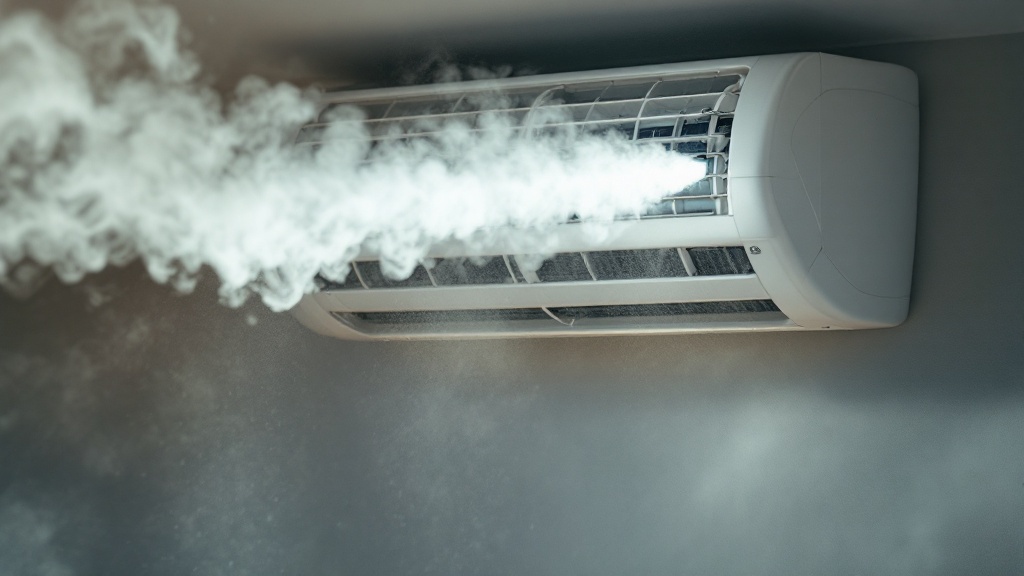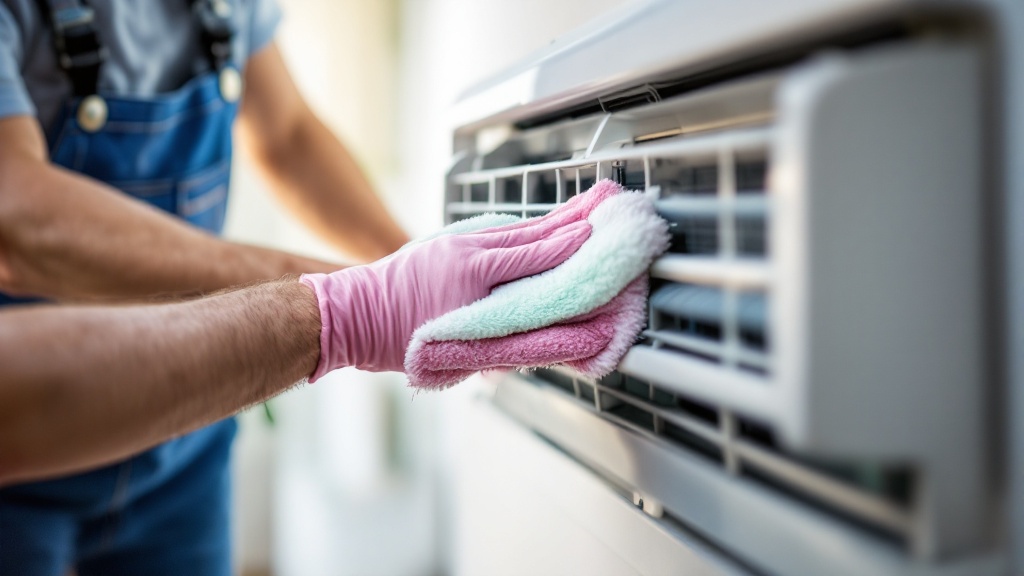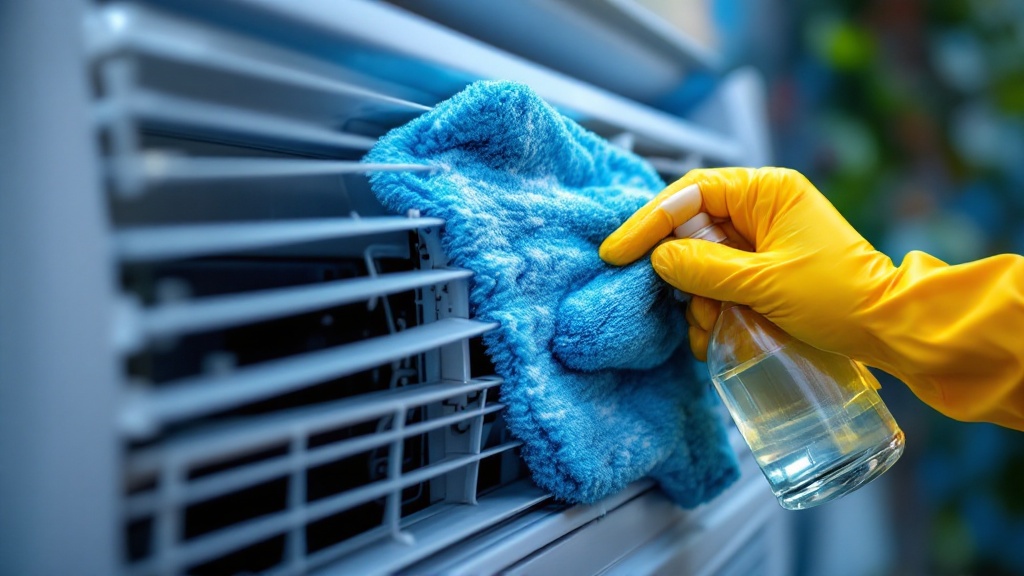When your air conditioning system starts to smell musty, it’s usually because of excess moisture and mold growth inside the unit – a problem affecting nearly 68% of AC systems over 8 years old. This unpleasant odor isn’t just annoying; it can signal potential health risks for you and your family.
Recent studies show that musty AC odors are often the first warning sign of more serious issues. About 1 in 3 households deals with this problem each year, and without proper attention, it can lead to respiratory issues and increased energy costs. The good news? Most musty AC problems are fixable with the right approach.
Think of your AC like a refrigerator – when it’s working correctly, you shouldn’t notice any unusual smells. Let’s explore how to get your AC smelling fresh again.
Understanding the True Cost of Ignoring Musty AC Odors

That musty smell from your AC isn’t just unpleasant – it’s costing you money. Let’s break down the real price you’re paying by ignoring those foul odors.
The Financial Burden of Musty AC Problems
When your air conditioning unit develops a musty odor, it’s usually working harder than it should. This extra strain leads to a shocking 15-30% increase in your energy bills. Think about it: that’s like throwing away $30 for every $100 you spend on cooling!
But that’s just the start. Mold and mildew growing in your system can cause: – Permanent damage to your AC components – Reduced equipment lifespan by up to 5 years – Costly mold remediation (averaging $2,000-$6,000) – Decreased property value by 10-20%
Health Costs You Can’t Ignore
The impact on your health can be even more expensive: – Average doctor visits for respiratory problems: $200-400 per visit – Allergy symptoms medication: $50-100 monthly – Lost workdays due to illness: $200+ per day – Long-term health issues requiring specialist care: $1,000+ annually
Air quality problems from a musty AC don’t just affect your wallet – they affect your whole family’s well-being. Fixing the issue now can save thousands in future medical bills and repairs.
Remember: What smells like a minor inconvenience today could become a major expense tomorrow. Don’t wait until your musty AC smell turns into a costly crisis.
The Science Behind AC Moisture Management
Your AC doesn’t just cool air – it’s also managing moisture levels in your home. Let’s break down how this works and why it matters for preventing those pesky musty odors.
Understanding Humidity and Condensation
When warm air hits your AC’s cold coils, condensation forms – just like water droplets on a cold drink. Your AC needs to handle this moisture properly, or you’ll end up with dampness that leads to mold and mildew.
The ideal indoor humidity should stay between 30-50%. Higher levels create perfect conditions for microbial growth. Think of it like a wet towel left in a dark bathroom – it’s bound to get musty!
Temperature Balance and Moisture Control
Your AC’s temperature settings play a huge role in moisture control. When there’s a big difference between indoor and outdoor temperatures, more condensation occurs. This is why you might notice more musty smells on really hot, humid days.
A properly sized AC will: – Remove enough moisture during cooling cycles – Maintain consistent airflow – Prevent stagnant air pockets
If your system is too large, it might cool quickly but won’t run long enough to dehumidify properly. Too small, and it struggles to remove enough moisture. Either way, you’re creating conditions where mildew can thrive.
Think of it like using a paper towel – you need just the right amount to soak up a spill. Too little won’t do the job, while too much is wasteful and might leave the surface damp.
Beyond Basic Cleaning: Advanced Prevention Techniques

Ever wondered why your AC system still smells musty even after cleaning? The answer lies in something tiny but mighty: biofilm. Think of biofilm as an invisible city where bacteria live and thrive in your air conditioning system.
Understanding the Biofilm Battle
Biofilm forms when microscopic organisms build their own protective shield inside your AC unit. It’s like a stubborn tenant that won’t leave! This slimy layer sticks to your AC’s components, especially in damp, dark areas where moisture loves to hang out.
Recent studies show that up to 90% of air quality problems in AC systems come from biofilm buildup. It’s not just about the musty odor – this sneaky substance can: – Reduce your AC’s efficiency by 30% – Make your energy bills spike – Spread unwanted particles through your home
Advanced Prevention Strategies
- Install UV-C lights in your ductwork
- Kills biofilm before it forms
- Works 24/7 without chemicals
- Use enzyme-based cleaners
- Breaks down biofilm naturally
- Safe for your system and family
- Monitor humidity levels
- Keep indoor levels below 60%
- Use a dehumidifier if needed
- Schedule quaternary maintenance
- Goes beyond standard cleaning
- Targets biofilm-prone areas
Remember: Traditional cleaning only removes surface grime. These advanced techniques target the root cause, keeping your air conditioning fresh and efficient year-round.
Smart Technology Solutions for Moisture Control

Modern technology has revolutionized how we handle musty AC smells and moisture control in our homes. Let’s explore some smart solutions that make dealing with humidity easier and more effective.
Smart Sensors and Monitoring Systems
IoT-enabled moisture monitors are game-changers for preventing musty odors before they start. These devices connect to your smartphone and alert you when humidity levels rise too high. Place them near your air conditioning unit or in problem areas like the basement for real-time updates. Popular models cost between $30-100 and can save thousands in mold remediation costs.
Home Automation Integration
Connect your dehumidifier and air conditioning system to your smart home hub for automatic moisture control. When sensors detect high humidity, your system springs into action: – Adjusts temperature control settings – Turns on ventilation systems – Activates dehumidifiers – Sends alerts to your phone
The initial setup costs $200-500, but you’ll save on energy bills and prevent expensive mold damage. Plus, many systems track patterns over time, helping you spot potential problems before they become serious issues.
These smart solutions work together to maintain optimal air quality and prevent those unwanted musty smells from returning. While the upfront investment might seem high, the long-term benefits of protecting your home and health make it worthwhile.
Professional vs DIY Assessment Methods

Want to know if your AC’s musty smell needs professional help? Let’s explore some reliable ways to check the problem yourself before calling in the experts.
Using Data-Driven Detection
Your nose isn’t the only tool for detecting air quality issues. Here’s how to gather concrete evidence:
- Use a moisture meter to check walls and surfaces near your AC unit – readings above 15% indicate a problem
- Get a digital humidity monitor for your home – ideal levels should stay between 30-50%
- Install a basic air quality monitor to track particulate matter and VOCs
- Check your air filter – if it’s dark or damp, that’s a red flag
When to Call the Professionals
Stop the DIY approach and contact an expert immediately if you: – Spot visible mold or mildew – Have moisture meter readings above 20% – Notice persistent respiratory problems – Find water stains or dampness spreading – Can’t locate the source of the smell after basic inspection
Remember: Professional testing might cost more upfront, but it’s cheaper than dealing with severe mold remediation later. Experts have advanced equipment to detect hidden moisture and airborne contaminants that home tools can’t find.
The Environmental Impact of Different Treatment Options
When dealing with a musty AC smell, it’s important to consider how different solutions affect our environment. Let’s explore eco-friendly ways to tackle this problem while keeping our planet in mind.
Carbon Footprint and Sustainable Solutions
Chemical cleaners might seem like a quick fix, but they can harm our environment. Instead, opt for natural alternatives like: – White vinegar and water solutions – Baking soda treatments – Natural air fresheners made from essential oils
These options not only help eliminate odors but also reduce harmful chemicals released into the atmosphere.
Long-Term Environmental Benefits
Making environmentally conscious choices for your AC maintenance pays off in multiple ways: – Improved energy efficiency – Reduced chemical waste – Better indoor air quality without harmful residues – Lower carbon emissions through proper ventilation maintenance
Using a programmable thermostat and maintaining proper humidity control can prevent musty smells while consuming less energy. Installing reusable air filters instead of disposable ones reduces waste and helps protect our environment for years to come.
Remember, regular cleaning and maintenance using eco-friendly methods not only fixes the musty odor but also contributes to a healthier planet.
Taking Action: Your Next Steps to Fresh, Clean Air
As a Montgomery County HVAC specialist, I’ve seen firsthand how a musty AC can impact your family’s comfort and health. Don’t let unpleasant odors compromise your home’s air quality – take action today. Our certified technicians are ready to help eliminate those unwanted smells and ensure your AC system runs efficiently.
Ready to breathe easier? Schedule your appointment online through our hassle-free booking system. We serve homeowners throughout Montgomery County, Bucks County, and Philadelphia with pride, offering same-day service and our satisfaction guarantee. Let’s work together to create the fresh, healthy home environment you deserve.





